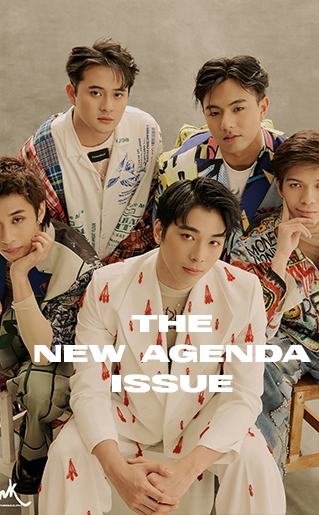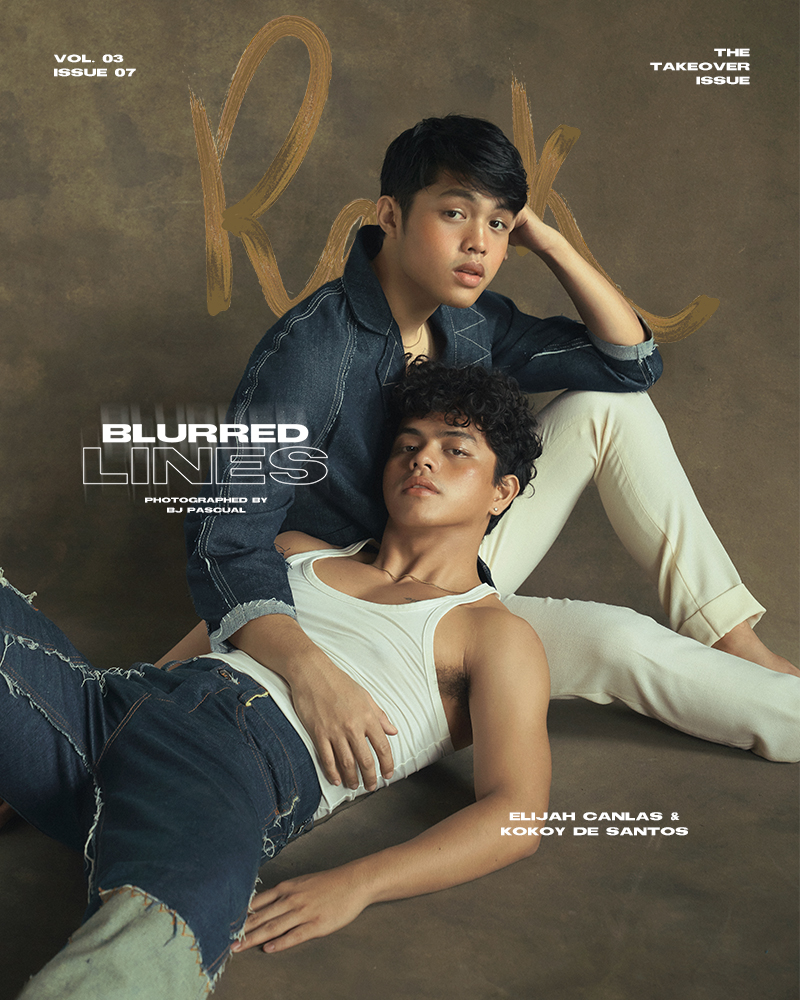
Twenty minutes earlier than the set call time, I receive a message announcing the arrival of the day’s cover subjects. Judith Bauer of The IdeaFirst Company, the production behind what can easily be said as the first and most significant online series that brought the Boy’s Love (BL) genre to local shores, Gameboys: The Series, signaled the official start of a collaboration that has been months in-the-making. She said, “Here na kami, nasa van lang muna,” (“We are already here. We are just in the van.”)
The message bridges the two-month (or so) gap since I last met with Elijah Canlas and Kokoy De Santos in a virtual interview as two relatively new-sounding names in mainstream entertainment, making waves online as they played career-defining roles as Cairo and Gavreel in the BL series last May. In the silence and anxiety of an unheard of quarantine, Gameboys replaced social media trending topics and online headlines previously held by Thailand’s 2gether: The Series.
With the success of the series, the two leads weighed in on the series’ inimitable impact on its loyal viewership that encompasses—better yet—transcends continents, nationalities, languages, and gender identification.
AN ARRIVAL
By the time the three of us meet again, now in the flesh, it is undeniable how they have advanced leaps and bounds from what and who they are as actors and now as iconic figures in just a matter of months since the #CaiReel love pair took the Internet by storm, giving conventional love teams a run for their money–far from the actors who are just trying to get by, given instructions via Zoom, filming themselves at home through their phones in the midst of a lockdown.
Now, theirs is an even more solid fanbase that consistently sings songs of praise on their every move, even after the series has officially closed the pages of its first season book—a stark departure from their lives in obscurity, even as they cop a string of roles and recognition in the independent circuit.
While fans have been patiently waiting for the return of the series and a feature film to boot, they have been temporarily left with limited-run and ongoing spin-offs featuring its equally talented supporting cast. But more than this, to enjoy the production’s unique and bold jabs at storytelling.
These developments, from an initial plan of four episodes before extending more and more to close at 13, in itself, are very indications of how Canlas and de Santos, with the BL series as their vehicle, have ultimately blurred the lines of national and even global prominence, commonly perceived to be impenetrable according to standards set by the usual suspects that people the mainstream industry, backed by giant networks with well-oiled marketing muscle, heavy star power machinery, and of course, legions of screaming fans.
The duo, as kings in their own rights, has since brought about a significant and necessary cultural shift in the way the world consumes and sees entertainment—landing on weekly trending topics on social media, amassing hundreds of thousands and millions of views in each of the show’s uploaded episodes, even crossing over to global brand partnerships and endorsements.
Easily put, this is a takeover, no less. And this, their origin story.
SMALL SCREEN, BIG TIME
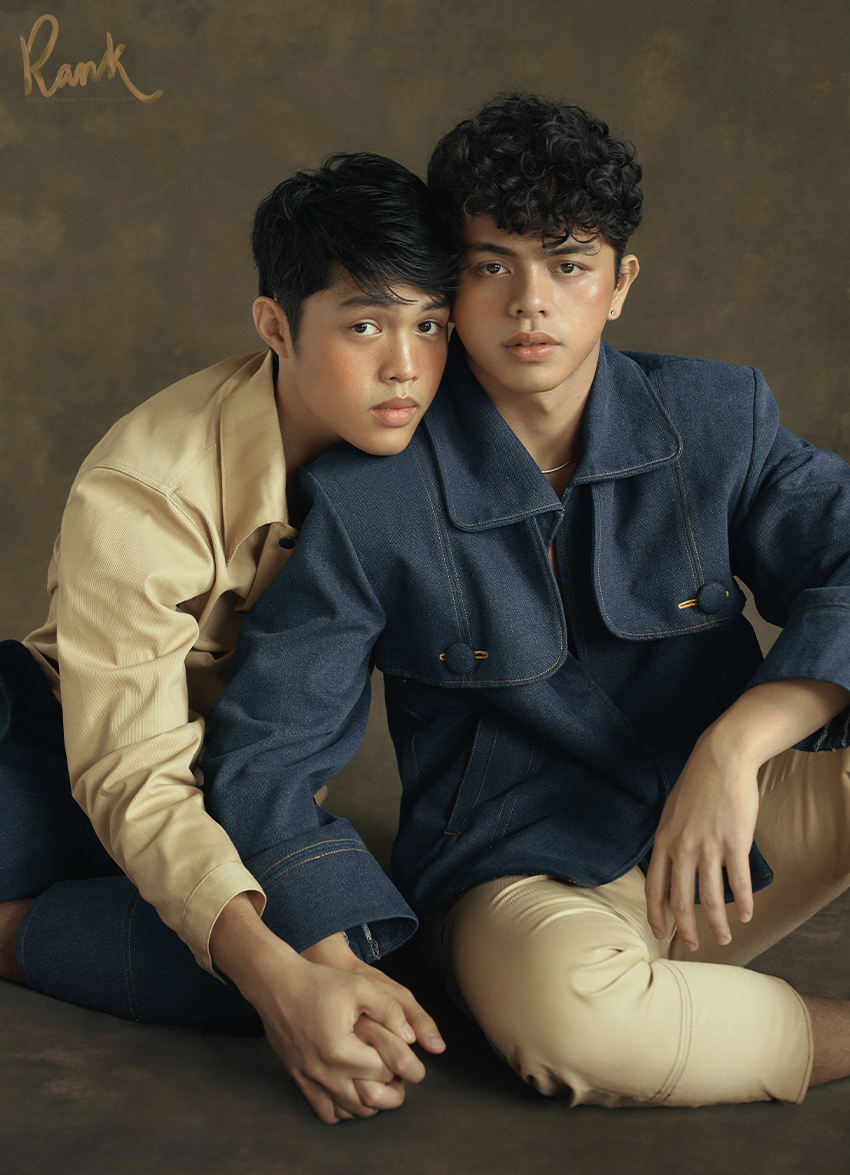
To both of them, their shots at fame seemed highly improbable—especially in a time as chaotic as 2020 when many, in and out of the industry, have projects put to an indefinite pause or worse, laid off their posts. As it is, being given a job in a time of unprecedented standstill was almost a rarity. But landing on a material that is so game-changing, leading to the meteoric rise of their celebrity was one that looks every bit divinely ordained.
“It took a couple of weeks into the quarantine before we started working on Gameboys. I felt hopeless, I felt like all my plans for this year, including all projects that are slated for the year are cancelled or suspended. I felt like my dreams died with it. I am lucky and blessed that Gameboys came that I could keep telling stories despite this pandemic,” I remember Canlas sharing when asked about landing on the project in this dark, trying time. “It’s what kept us sane, me, at least, during this pandemic,” he added.
In what can only be described as a weird world of isolation that we are presently in, a tumultuous time marked by distance, silence, and absence of connection, Gameboys served a sense of calm and a reawakening of people’s sensibilities to what it really means to be human—to be capable and deserving of love.
This was in no small thanks to the creatives, the real lifeblood that fueled and made the series what it is, from Ash Malanum’s writing to Ivan Payawal’s direction down to how the production design has aided significantly in the storytelling. All of these are under the tutelage of Perci Intalan and Jun Lana, both multi-awarded filmmakers and storytellers that blazed the trail in weaving a compelling narrative, laced with subtle but powerful efforts to open up dialogues on age-old issues on misrepresentation, diversity, and discrimination.
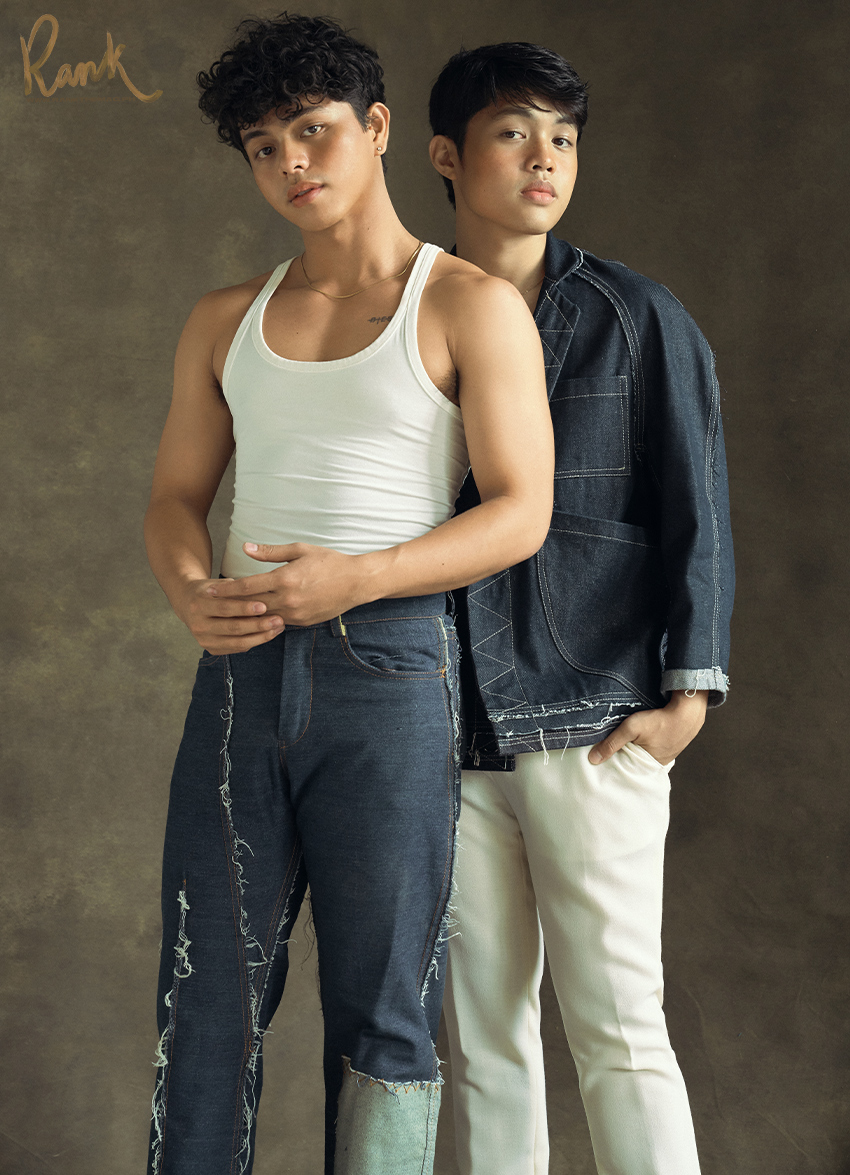
In Gameboys, there are neither high-octane action, knee-slapping comedy, nor teleserye drama. Neither does it have fancy camera work, visual effects, nor A-listers as leads. All the viewers saw are two young men, in and out of video calls, portraying various levels of onscreen chase, before leading to a denouement that brought viewers to feel, think, and believe in a new order that is beautiful and possible.
What Gameboys built is a world that is both familiar and aspirational, tackling present state of things while using it to inconspicuously paint possibilities in a world rid of constricting social constructs and gender norms.
In, and of itself, hidden in its success, Gameboys stopped from being a BL series, not relying on sugary romance laden with cute interactions. Instead, it launched a quiet but powerful pop cultural blitzkrieg that indiscriminately toppled down old order to show us a world where nothing has to be explained—it just is. No questions asked. No othering.
In every sense, a cathartic cultural moment that, judging by viewer reception, is bound to ignite a ripple of change in the Filipino psyche and of the world with new ways of seeing.
All of these, meriting nods of approval from critics and viewers, pushed the series to be a national quarantine obsession with a surge in supporters and ardent followers on a global scale, even spawning an influx of titles tailing in its success, from independent to mainstream production outfits. It is safe to say that this forwarded a timely, necessary education and evolution of a much discerning viewing public that celebrates humanity, free from judgment and biases.
ON THE CHARM OFFENSIVE
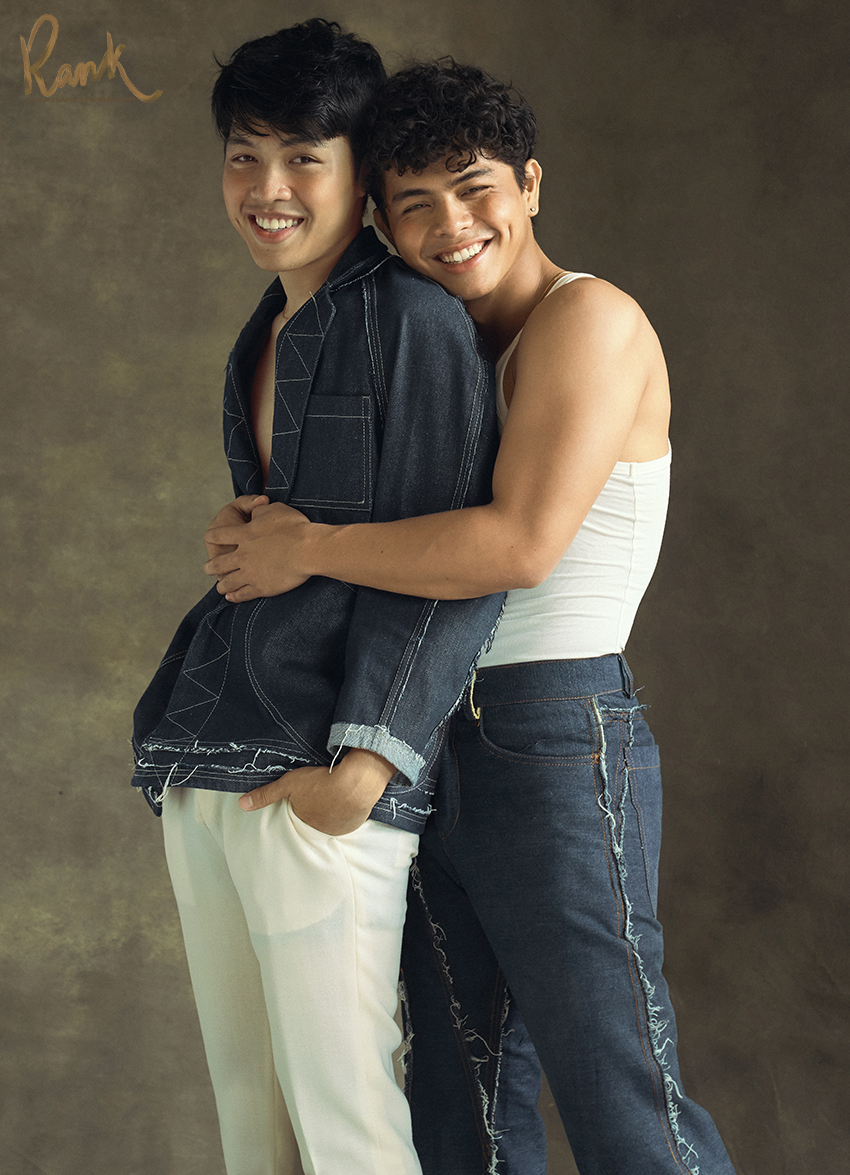
In the middle of it all are two young charmers in modest, lean 5’8”-5’9” frames, who, by the looks of it, remain to be widely unaware of the necessary cultural revolution they helped start. One look and it is hard to miss that the two young actors stay oblivious of their impact and influence by effectively bringing a story not just of intimacy and love between two young men but the intricacies and delicacy of the role of the family in shaping one’s identity and sense of self.
On the day of their Rank Magazine cover shoot, following brief pleasantries, the two carefully remove their masks to let out unassuming smiles, as they get made up to grace their first editorial outside of the show’s promotional materials as a pair.
The whole of the team in Shutterspace Studios threw a collective gasp of “finally”, after hurdling months of waiting for safety restrictions to ease and protocols to be enforced. Joe, the day’s associate videographer, couldn’t help but let out a giddy laugh at the idea of the two finally posing together.
I ask him what makes Gameboys his ultimate quarantine obsession. He said, “Di naman sila yung pinakaguwapo at pinaka-‘artista’ for me, pero yung commitment nila sa roles yung alam mong pinagtrabahuhan nila and yung chemistry nila is to-die-for,” eyes rounding as saucers as he finished the description. (“They may not be the most attractive and the biggest celebrity we know, but their commitment to their roles is very apparent and you know that they work hard for it, as well as their chemistry. It is to-die-for.”)
Even BJ, former Statement Issue cover subject and the day’s photographer, lets out generous compliments in between shots—especially at times when they throw hilarious side comments and, out of habit, exchange “baby” tags to refer to one another.
“Grabe kayo!” (“You’re unbelievable.”) The fashion photographer comments to the whole set as the two tease and exchange banters while being photographed. “I only got to watch a couple of episodes when I got the chance, but I knew Kokoy and Elijah would really be superstars,” he shares as we take a break and look into the rest of the garments to be worn by the cover stars.
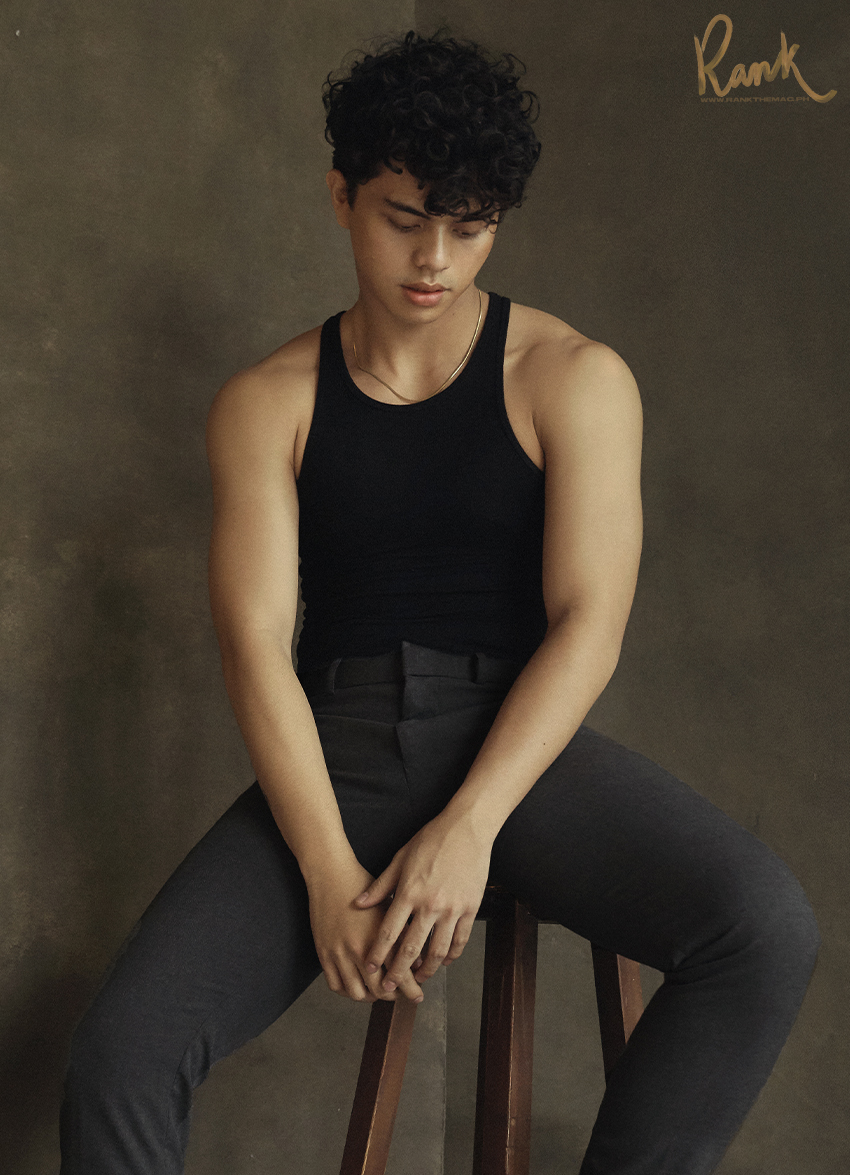
“How are you taking this newfound fame?” I remember asking the two the first time. de Santos, in his familiar dimpled smile, remarked, punctuated by a sheepish laugh, “Sobrang nakaka-overwhelm at sobrang blessed kami, dahil hindi naman lahat nabibigyan ng ganitong opportunity, lalo na ngayon.” (It is overwhelming and I feel blessed that we were picked to play these roles as not everyone gets to be given this kind of opportunity.) He adds, “Wala naman sa aming nag-expect na magiging malaki ito. Di naman kasi namin inisip na magpasikat. Ang sa amin eh magawa namin ng maayos yung pinapagawa sa amin.” (Nobody really expected it to be this big. What is important for us at the time is to do what we are supposed to do the best way we can.)
Canlas then seconded, in a show of bonhomie and an apparent sense of wonder in his voice, “We didn’t expect this at all. I am, of course, thankful to Gameboys and the whole fanbase because this is what’s keeping us sane these past couple of months. With all the chaos that is happening in our country and the world, in general. Gameboys is what’s saving me at least,” he declares. “But I laugh whenever we are told that because no one among us, especially between Kokoy and I would believe that. Yes, we acknowledge all the recognition and all the positive comments, the fans and all that but we can’t really believe that the show is THAT big and that successful because we haven’t been out. It just feels ‘normal’. It feels like we’re just working everyday, doing what we love, and we’re blessed to do what we love in a time like this.”
True enough, while there are no gathering en masse this time of the pandemic, as Gameboys opened new methodologies of creating content with all the limitations of a “work-from-home” set up, it also reshaped the way we measure and certify success—no coliseums and malls to fill, no phalanx of squealing fans and mob of media reporters that follow their every move.
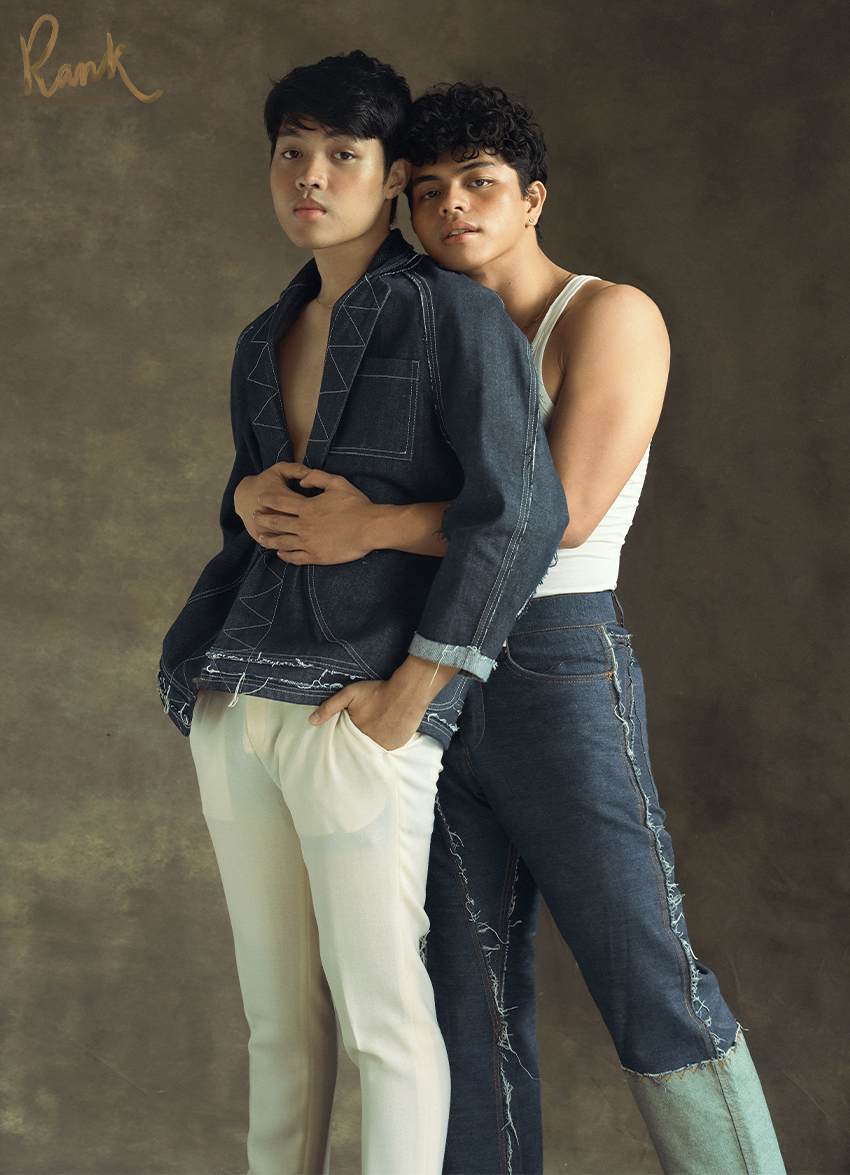
What the two, and the series, enjoy is a solid fanbase that awaits their next outings—apart, as respected young actors in their own rights and together as EliKoy, a portmanteau that the fandom fondly christened them with. Every bit of visibility, be it a new project, an endorsement, a virtual or taped guesting or just a random social media post is marked as a celebration for the supporters who have grown to cheer them on even outside the series, making them, in the context of the current situation, elusive commodities.
“More than the compliments and the reviews that it is the best show, or whatever. It’s really more about the audience reception and the recognition that we are getting–and the messages that we’ve all been getting, even the team. That the show inspires them to keep going—some of them were even inspired to come out to their families and their friends which is a big deal, if a show can do that,” Canlas talks about their growing celebrity and the influence that comes with it.
“Big deal yun pero tayo, hindi natin ginagawang big deal yun kasi ang gusto natin ay maging kumportable sila sa sarili nila at sa proseso, (It is a big deal, but us, we do not make it into a big deal. At the end of the day, we just make sure that they become comfortable of themselves to get to that process)” de Santos squeezes in a thought.
“Our show became one of the ways for everybody to feel and be comfortable, to be open to these types of stories and to themselves. So inspiring,” Canlas added.
AN EDUCATION
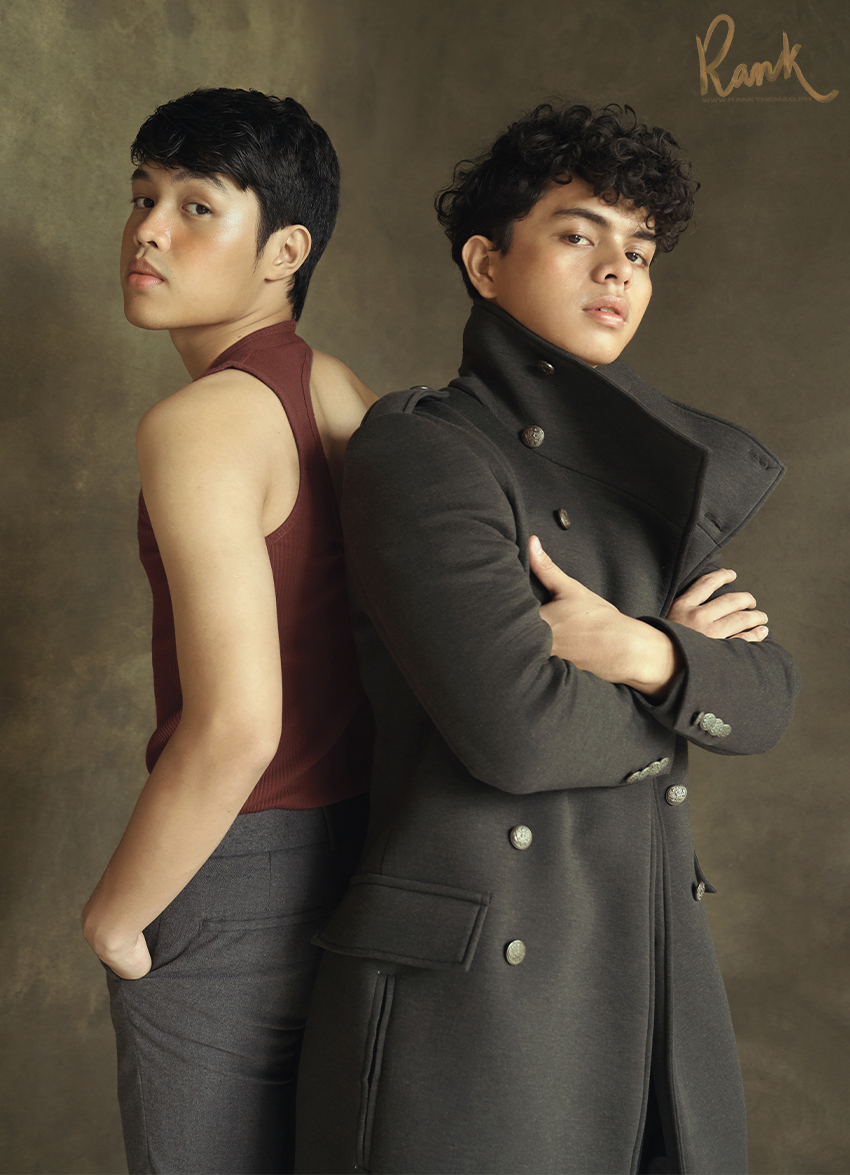
All in all, even as the two make a convincing impression of celebrities who have gone used to the sudden global attention and the praise with great professionalism and verve, at close inspection, at least in the duration of their Takeover Issue shoot, just like the name of the series that propelled them to national consciousness, they remain to be two young boys having the time of their lives, doing what they have always dreamt of.
de Santos, contrary to his role as the devil-may-care Casanova on a chase for his object of affection, is a suave, but occassionally quiet young man of 22, with a megawatt smile and carefree laugh that fills rooms, but silently keeps to himself and his phone from time to time. His is a likability that is both familiar and intriguing—a presence that is charming but one that does not call for attention. It’s this schoolboy mystique that draws his fans to his every move, adoring his impalpable depth, hidden under the guise of his evident candor, or his cheeky 15-second videos on TikTok sweating it out to a trending dance craze or a brief comedic sketch and even his occasional thirst-traps.
On the other hand, there’s Canlas, this well-spoken young man of 20 who likes humming old school to modern urban ditties, as he throws playful and sometimes sarcastic quips to his partner and to other members of the shooting team as he eagerly listens for instructions on his next pose. Behind the eloquence and the clarity of views, his is a geniality that is intoxicating and refreshing—reminiscent of that friend you haven’t seen in a long time but still magically knows how to connect and make you feel seen.
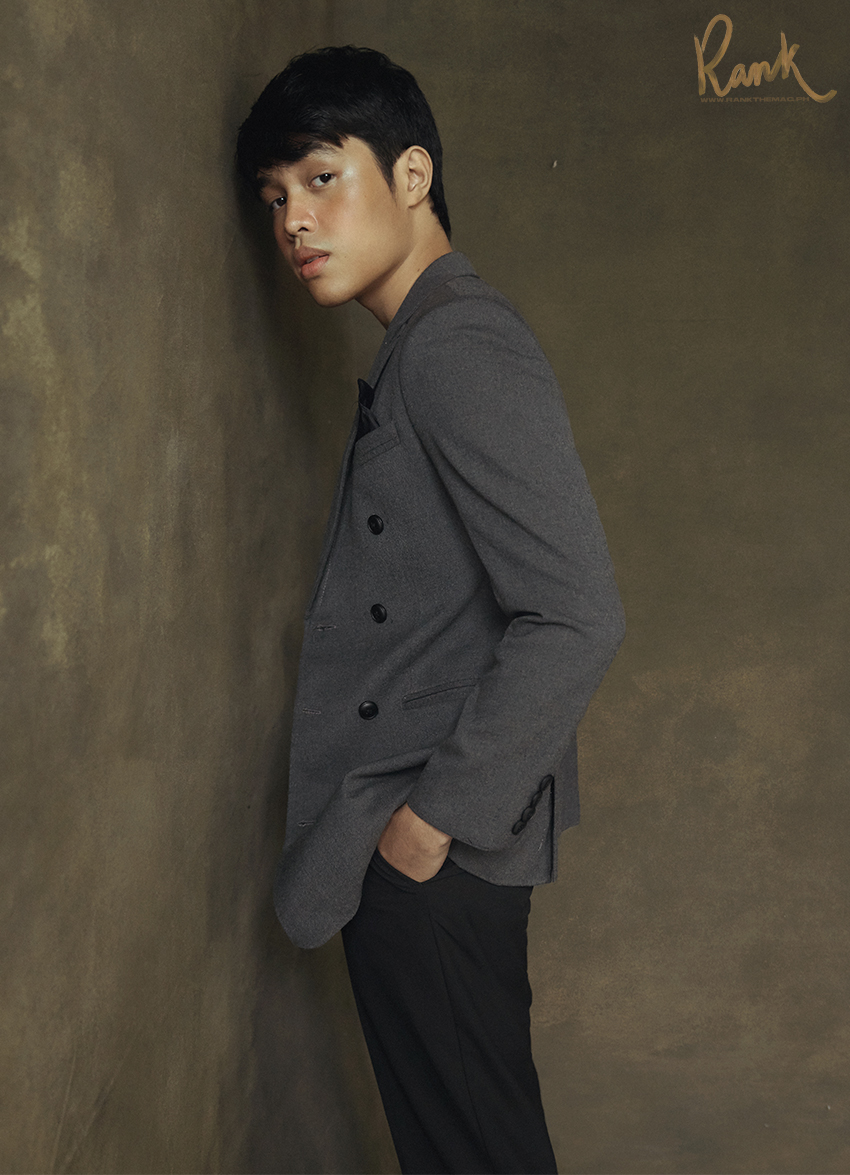
Decked in his blue hoodie, Crocs, and printed socks, his eyes ball like apples when he spotted a collection of vinyl records neatly arranged at the lounge area of the studio. Like a kid gifted with a key to Willy Wonka’s chocolate factory, he immediately calls on his partner-in-crime to show records he mentions they were talking about that he is fascinated to find in an unlikely location. “May CCTV ba dito?” (Is there a CCTV camera here?) He jokes having the itch to take one of the records from the studio.
After all, being a musician is among the string of career paths he gamely outlined when asked what he would have been if the glittery world of show business had not found him. With the same question, de Santos responds with certainty, a business on cooking.
Interestingly, even sharing these, the two quickly revert to filmmaking and life in the world of cinema to be their career, rather, life of choice. It’s this innocence and sincerity of their mastery and love for their craft that brought supporters soldered to their screens, all with a potent idea that what they are seeing is just the beginning of two juggernauts-in-the-making.
“As a kid, I was really addicted to cinema and films. So, when I got to be in a film, I was so mesmerized because I get to see what happens behind the scenes, how they do it,” Canlas recollects. “Dati pinapanuod mo lang. Ngayon andun ka na, nasa harap ka na ng camera, at nakikita mo pa lahat ng kailangan para makagawa ng pelikula.” (I was just watching this before and now, I am already in front of the camera, and I can see everything that is needed to do a film.)
“Ako? Dati pa gusto ko na talagang mag-direct. Pero nung nakilala ko tong mga taong to sa production, na-realize ko na kakailanganin ko ng pasensya talaga. Kung nakakapagod ang ginagawa namin, mas grabe yung pagod nila, at yung knowledge nila,” de Santos shares. (Me? I really want to direct, ever since. But when I met people in this production, I’ve realized I would need a lot of patience. If what we are doing is tiring, what they’re doing is on a different of level of ‘tiring’. And their knowledge that they apply to it is really different.)
“And my favorite part about it is that I get to tell stories. That’s really it. I love telling stories. I love portratiyng characters and I am so blessed that people trust me enough with their stories and their characters,” Canlas adds, words to express his continuing romance with the art of storytelling, escaping him.
In 2014, a 14 year-old Elijah Canlas would go on an audition for a Cinemalaya Philippine Independent Film Festival entry “Sundalong Kanin” by happenstance, when the directors of the film scouted for young leads to join the cast. His acting portfolio would then beef up with support roles in acclaimed independent titles, from Sakaling Hindi Makarating in 2016, then in 2019 for Babae at Baril, LSS, and Edward, before landing on the challenging lead role of Kalel, in the awarded film Kalel, 15, which earned him his first-ever top international award as Best Actor at the 17th Asian Film Festival, awarded in the midst of the quarantine.
Starting just a year earlier in the business, de Santos first dipped his toes into acting in 2011, for GMA Network’s Futbolilits, before landing on bit and supporting roles on television and in mainstream and independent films, from Bromance: My Brother’s Romance in 2013, Kimmy Dora to a slew of roles in Tumbang Preso (In The Can), Kid Kulafu, Die Beautiful, and Signal Rock. It was in 2019 when he took on the role of Miko in the gripping Cinemalaya film, F#@bbois, when he snagged a nomination with co-actor Royce Cabrera for their performance in the film at the esteemed Young Critics Circle.
However, in all of the roles they have played, that any aspirant can only dream to tick off their to do lists, it is not surprising to hear that playing Cairo and Gavreel for Gameboys has been the most challenging, more so, hardest to shake off.
“Di kasi gaya ng ibang mga karakter na nakakapag-shoot sa labas at umuuwi, na nakakapagpagpag ka. Dito, pag sinabing ‘pack-up’, tatanggalin ko yung camera tapos nasa sala at kwarto ako, pero minsan pakiramdam ko ako pa rin yung character,” de Santos describes. (It is not the usual shoot where you shoot outside and then you get to go home, so you get to shake your character off. Here, when they say ‘pack up’. I remove the camera and then I am in my room and living room, I still feel like I am the character I play.)
Supporting this, Canlas shares, “It’s really hard, especially at first, to separate from our characters. But we got used to it, eventually.”
FOR THEIR NEXT TRICK
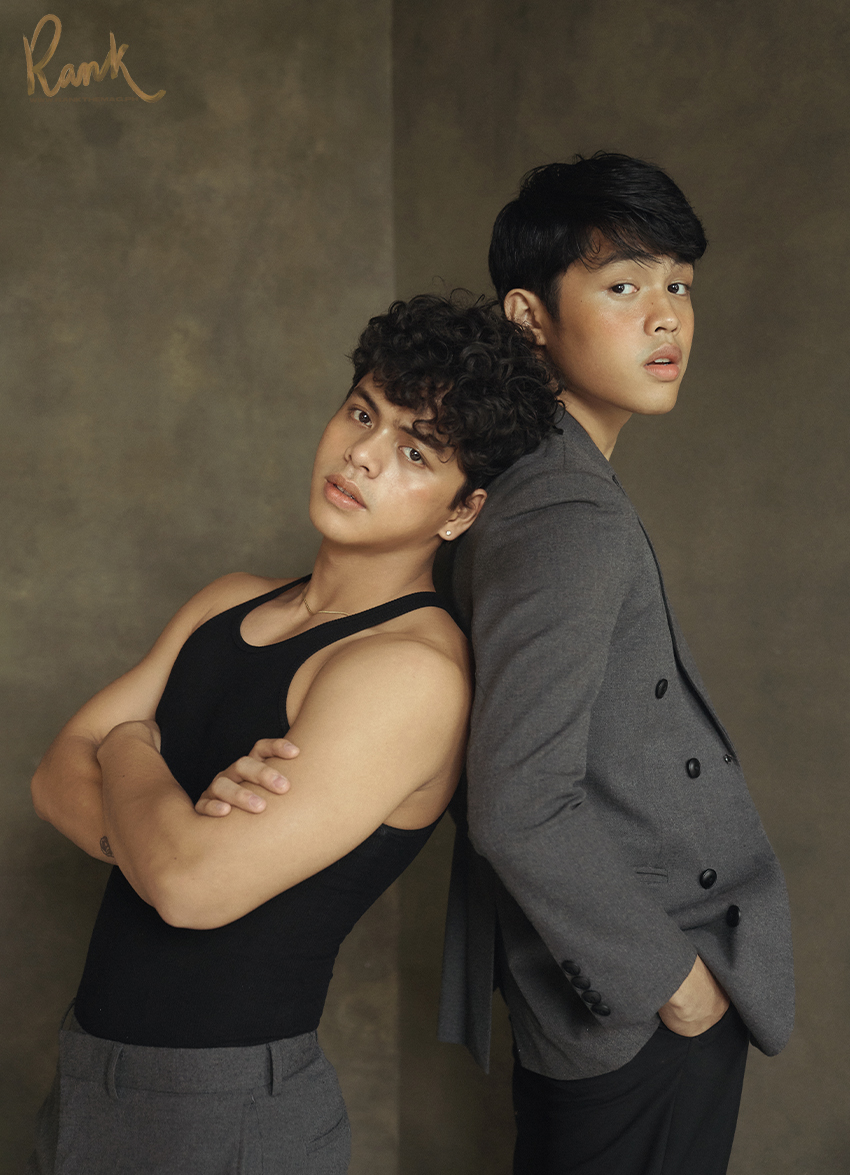
If anything, taking on this challenge, makes the young actors look forward to a world where they can step in the shoes of more characters they dream to play. And the list is limitless.
But as de Santos waits for a role in a classic Filipino romance film like that of Robin Padilla’s, opposite Sharon Cuneta in the iconic romantic-comedy, Maging Sino Ka Man and Canlas, dreams of something as physically and mentally challenging like that of Daniel Day Lewis in My Left Foot, and Dustin Hoffman in Rain Man, the acting tandem is rolling their sleeves up to explore roles and projects outside of the universe built by Gameboys.
Canlas is expected to appear in a TV5 series Paano ang Pasko, opposite a wealth of industry bigwigs from Ricky Davao, Allan Paule, Maricel Laxa, to Beauty Gonzales. De Santos’ newly-released series, Oh, Mando, with F#@bbois writer and director, Eduardo Roy, Jr. is presently well-received by fans even in its first episodes, while working on a musical venture with Star Pop.
The pair’s on-screen collaboration continues in a short film helmed by Petersen Vargas, How to Die Young in Manila, shot long before their experimental pairing in Gameboys, which premiered at the Busan International Film Festival. Late this November, the 12-minute film is set to be screened online for the 31st Singapore International Film Festival.
By this time, dialogues on BL as a genre, has been openly discussed, from its origins and its intended audience, to its strides on inclusion and representation taking its rightful time in shaping queer identity and politics with a wide-reaching, mainstream audience, down to its many criticisms and woes on proper representation and visibility of actual members of the LGBTQIA+ community in its cast.
“That’s a really serious issue,” Canlas explains. “I just hope that there would be equal opportunities for everyone. That everyone will be given a chance—all the actors, any sexual orientation or any community that you come from.” He continues, “And ultimately, we hope that all audiences will see beyond the label placed on the actors and instead, they just see the characters that come to life. Even if an LGBT actor plays a straight guy, we hope that the audience could go beyond that label and see them for their talent and their skill as long as they are represented well.”
“Para sa akin isang malaking karangalan ang magampanan ang mga ganitong karakter. Bilang aktor, obligasyon namin na mabigyan ng hustisya ang mga ganitong mga karakter,” supports de Santos. (It’s an honor to portray or represent this type of character. As an actor, it is our obligation to give justice to these characters.)
Canlas furthers, “As an actor, there’s a pressure for me to portray it the most human as possible and that’s the challenge. But it’s not much different as to playing any other role. It’s the same approach because they are all human beings and they are all people and we have to treat them as such. So, I have to portray it the right way.”
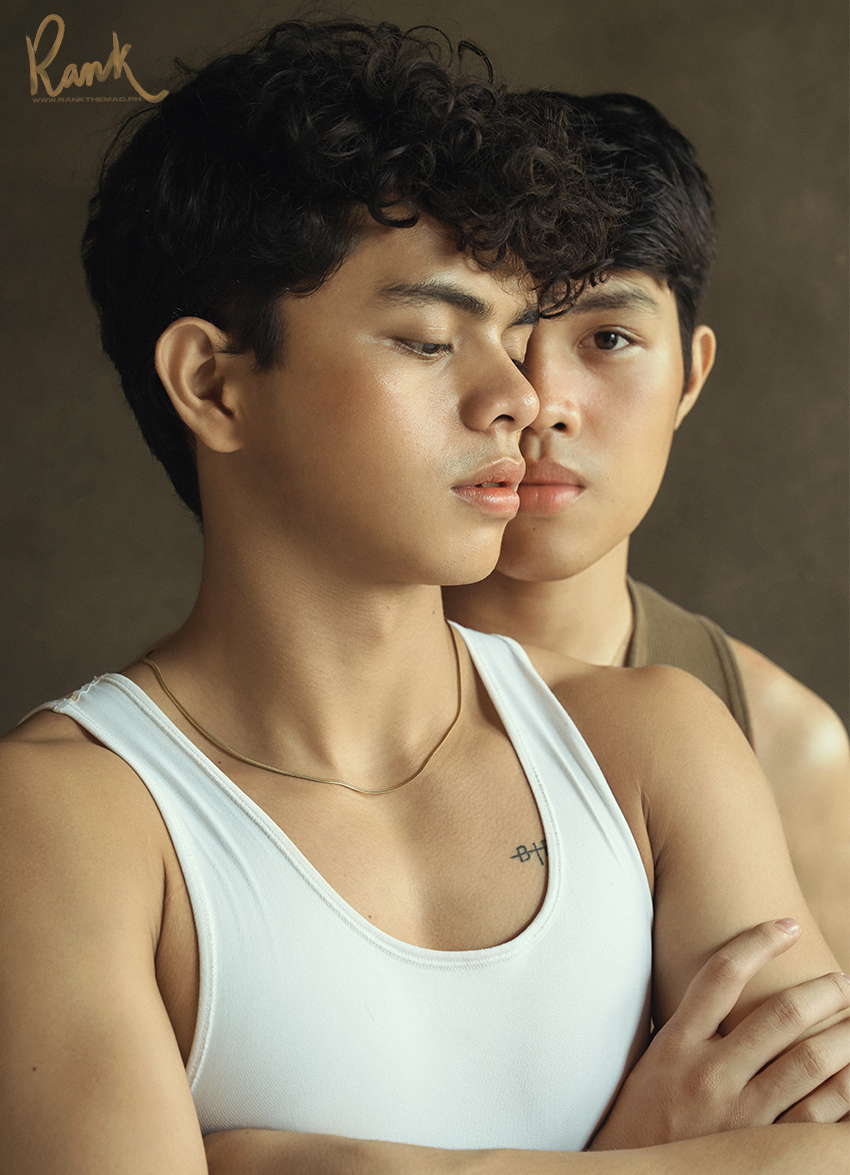
In anticipation of the series’ return for its second season and the full-length film that people have long been waiting since its announcement first hit the press, the battle for visibility and representation rages on, as more and more titles come forward and more and more actors in and outside of the community bring stories of love and humanity amid labels to the fore—some reaching close or equaling its impact to that earlier set by Gameboys.
“People are ready. This country is ready for these types of stories. We are ready to normalize this kind of relationship. And I think it’s about damn time—it should have been a long time ago—but now, it’s time we accept it. If you’re not ready, it’s on you. I am thankful that shows like this normalize that kind of love and we’re slowly changing this country and this world for the better,” Canlas shares. “It’s time to open your mind and your eyes to these types of stories, cause it’s really not different from the conventional ones you’re used to seeing.”
***
In an ideal world, close to the one built by and tackled in Gameboys, where who you are matters and placed complete value without having to ask questions, one’s identity needs not be reduced to a diminutive letter in an acronym to be afforded the recognition and a sense of belongingness every single one of us deserves. Because, at our very core, when we strip off titles, labels, and pronouns, what is left is our humanity. Above all else, this holds the greatest power. And yes, ideal world or not, there shouldn’t even be a fight to begin with.
To say that Gameboys has taken on and carried this cause solely on its shoulders would be a disservice to a great number of local and international films and even online series that have come before it. But in its modern retelling, the doors it opened, the road it paved for those that have come after it and the immensity of the impact it etched in global consciousness mark the series as a shining modern-day purveyor of this movement of thought. This makes us believe that we are inching closer, and efforts put forth by those before the series have not gone to waste.
The end of the relay is farm from close. But to see more and more join in their bold move to fan the fire of awareness, compassion, inclusivity, and empathy shows us that the road ahead is brighter than ever, from here on out.
To a viewer and a human being, the torch is now within your reach. Now, the question stands, are you going to pass or are you going to play?
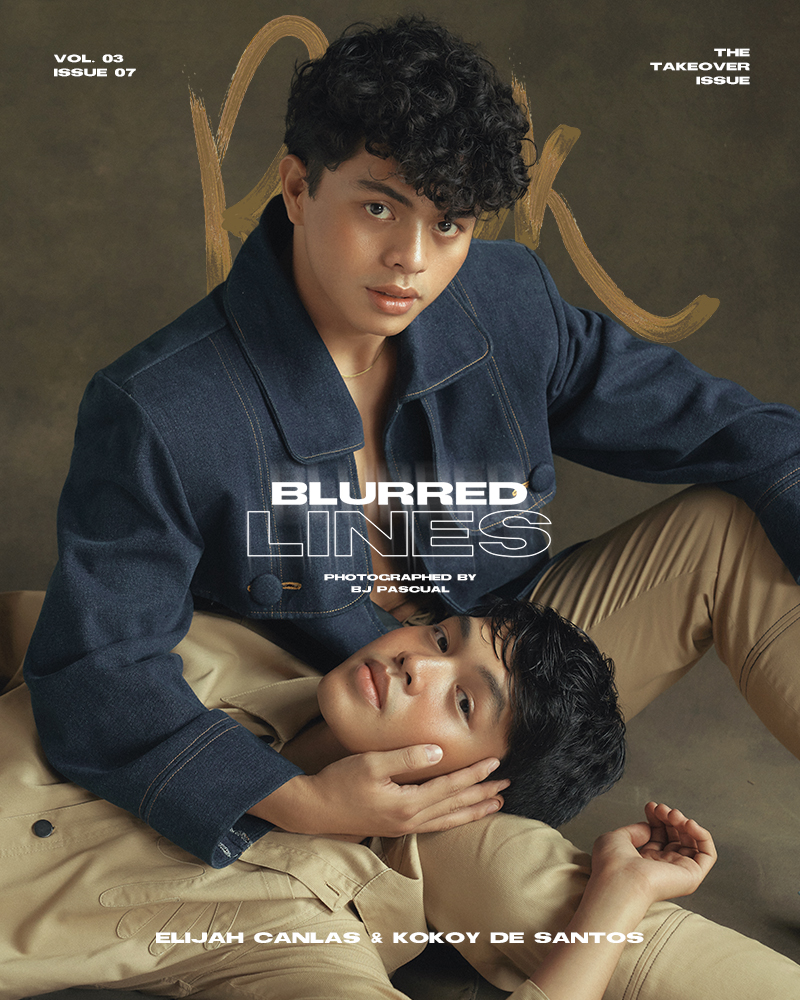
Produced and creative direction by Leo Balante
Photography by BJ Pascual
Styling by Leo Balante with BJ Pascual
Fashion by Avel Bacudio, Edwin Tan, Kelvin Morales, Carl Jan Cruz, and DDDaily
Grooming by Nadynne Esguerra
Videography by Christina Zabat and Joe Andy
Photographer’s Assistants: Richard Detita and Ruel Estrellis
Cover and featured banner design by Jericho Clemente
Shot on location at Shutterspace Studios
Special acknowledgments: Judith Bauer, Ferdy Lopez, Perci Intalan, and Jun Lana at The IdeaFirst Company
And to the countless of fan-powered groups and communities that cheered us on, especially Kokoy Global Official, Kokoy Global California, Thirdwheels OFC, Kokoy Nation Official and Kolokoy Forever



